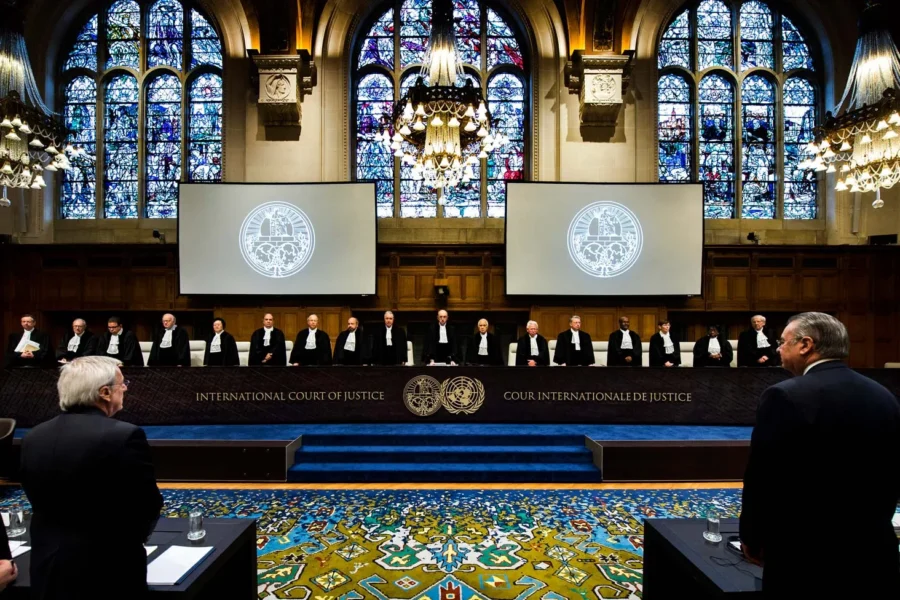The International Court of Justice (ICJ) has issued a landmark opinion, declaring Israel’s ongoing occupation of Palestinian territories, including East Jerusalem, to be in violation of international law. This advisory opinion, requested by the United Nations General Assembly (UNGA), has significant implications for international law and the Israeli-Palestinian conflict.
- Occupation Violates International Law The ICJ concluded that Israel’s occupation, which began in 1967, breaches multiple international laws. The Court emphasized that occupations must be temporary and cannot confer sovereignty to the occupying power. The prolonged nature of Israel’s occupation violates the principle of self-determination for the Palestinian people and the prohibition against acquiring territory by force.
- Israel’s Obligations The ICJ ruling mandates Israel to end its occupation of the Occupied Palestinian Territory (OPT), cease the construction of settlements, and dismantle existing ones. Additionally, Israel is required to make reparations to those affected by its actions in the occupied territories. This includes compensating Palestinians for the damage and losses suffered due to the occupation.
- International Community’s Role The ruling calls upon all states and international organizations not to recognize Israel’s occupation as lawful. This directive extends to avoiding any support that might legitimize or perpetuate the occupation. The ICJ’s decision reinforces the global consensus on the illegality of Israel’s actions in the OPT and underscores the need for international solidarity in addressing this issue.
- Legal and Ethical Implications The ICJ’s opinion highlights the necessity of upholding international humanitarian and human rights laws. It reaffirms that the acquisition of territory through force is impermissible under international law. The ruling also emphasizes the right to self-determination for the Palestinian people, a fundamental principle enshrined in international legal instruments.
- Calls for Action by the United Nations The ICJ’s advisory opinion encourages the UNGA and the Security Council to take decisive actions to end Israel’s occupation. The Court’s opinion serves as a legal and moral basis for the international community to pursue measures that ensure compliance with international law and protect the rights of the Palestinian people.
Dissenting Opinion
ICJ Vice President Julia Sebutinde provided a dissenting opinion, expressing reservations about the appropriateness of issuing an advisory opinion in this context. She acknowledged the Court’s jurisdiction but questioned the timing and potential implications of the ruling.
Key Points of the Dissenting Opinion
- Jurisdictional Concerns: Vice President Sebutinde acknowledged the Court’s jurisdiction over the matter but raised concerns about the appropriateness of issuing an advisory opinion at this juncture. She argued that the ICJ should exercise caution in matters involving ongoing political disputes where the primary responsibility lies with political entities such as the United Nations Security Council.
- Political Implications: Sebutinde emphasized the potential political implications of the advisory opinion. She cautioned that the Court’s involvement in highly politicized issues could affect its perceived impartiality and credibility. According to Sebutinde, the advisory opinion might be viewed as taking sides in a complex and deeply rooted conflict, which could undermine the Court’s role as an unbiased judicial body.
- Effectiveness of Advisory Opinions: The Vice President questioned the effectiveness of advisory opinions in resolving entrenched conflicts. She pointed out that while advisory opinions can clarify legal principles, they often lack the binding force needed to compel state action. In highly contentious issues like the Israeli-Palestinian conflict, political solutions and negotiations are typically more effective in achieving lasting peace and compliance with international law.
- Potential for Increased Tensions: Sebutinde expressed concern that the advisory opinion could exacerbate tensions between the parties involved. She argued that the ICJ should be mindful of the potential for its rulings to influence political dynamics and possibly lead to unintended consequences, such as hardening positions or provoking retaliatory actions.
Broader Implications
The ICJ’s ruling sets a significant precedent for addressing prolonged occupations globally. It reaffirms the principles of international law and serves as a reminder of the importance of justice and accountability in conflict situations. The decision also underscores the role of international legal institutions in upholding human rights and promoting peaceful resolutions to long-standing conflicts.
Conclusion
The ICJ’s advisory opinion on Israel’s occupation of Palestinian territories marks a pivotal moment in international law. By declaring the occupation unlawful, the Court has reinforced the principles of self-determination, territorial integrity, and the prohibition of forceful territorial acquisition. This ruling calls for immediate action by the international community to ensure compliance with international law and to support the rights of the Palestinian people.
Contributed by Aditya Gupta (Intern)
OP Jindal Global University


Their global health resources are unmatched.
can i buy generic lisinopril online
A one-stop-shop for all my health needs.
Their global outlook is evident in their expansive services.
cost lisinopril without prescription
Their worldwide pharmacists’ consultations are invaluable.
Setting the benchmark for global pharmaceutical services.
how to buy cheap lisinopril without rx
Read information now.
Their mobile app makes managing my medications so easy.
how to get generic cytotec pill
A pharmacy that prioritizes global health.
The staff always remembers my name; it feels personal.
get cheap cipro pills
Outstanding service, no matter where you’re located.
The staff always remembers my name; it feels personal.
can you take gabapentin and hydrocodone at the same time
They make prescription refills a breeze.
Excellent blog right here! Additionally your web site lots up fast! What host are you the usage of? Can I am getting your affiliate link to your host? I want my site loaded up as fast as yours lol